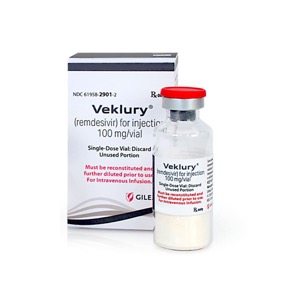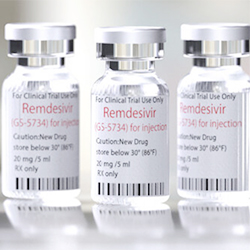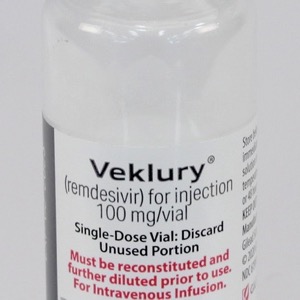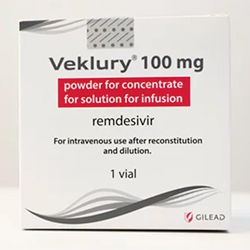By IDSE News Staff
The FDA granted a supplemental new drug application (sNDA) for the use of remdesivir (Veklury, Gilead Sciences) with no dose adjustments to treat COVID-19 in people with mild, moderate and severe hepatic impairment.

The clinical benefit of remdesivir in hospitalized populations with COVID-19 is supported by randomized controlled trials, real-world evidence and meta-analyses, but the pharmacokinetics of the antiviral had not been evaluated previously in patients with hepatic impairment. This latest indication is based on results from a phase 1 study of safety and pharmacokinetics in those with hepatic impairment (GS-US-540-9014). No new safety signals were observed.
The multicenter, open-label, single-dose study evaluated the pharmacokinetics of remdesivir and its metabolites in participants with normal hepatic function and moderate or severe hepatic impairment. Participants with varying severity of hepatic impairment and normal hepatic function were enrolled as follows: cohort 1: 20 participants (10 with moderate hepatic impairment and 10 matched controls with normal hepatic function, for a target of eight evaluable per group), and cohort 2: 12 participants (six with severe hepatic impairment and six matched controls with normal hepatic function).
Based on the results, the label has been updated to reflect that no dose adjustment is required across all stages of liver disease. The label still recommends initial liver function tests in all patients before starting remdesivir and during treatment as clinically appropriate, and that discontinuation be considered if alanine transaminase (ALT) levels increase to 10 times the upper limit of normal or if ALT elevation is accompanied by signs or symptoms of liver inflammation.
More than 100 million U.S. residents are living with liver disease. Furthermore, people with liver disease represent a population that is vulnerable to COVID-19 and are at increased risk for morbidity and mortality. People with severe liver disease currently have limited treatment options for COVID-19.
This approval supports the safety profile of remdesivir, a nucleotide analog prodrug, as the only approved antiviral COVID-19 treatment that can be used in all stages of liver disease, the company said in a statement.
“The update to the safety profile and dosing recommendations for Veklury for those living with liver disease is important to this vulnerable population who faces an increased risk of complications from COVID-19,” said Douglas Dieterich, MD, the director of the Institute for Liver Medicine, and a professor of medicine in the Division of Liver Diseases, Icahn School of Medicine at Mount Sinai, in New York City. “While COVID-19 is no longer a public health emergency, the virus continues to present a threat to those with underlying conditions.”
This approval follows the recent FDA decision to extend the approved use of Veklury to treat COVID-19 in people with severe renal impairment, including those on dialysis.
Remdesivir works by directly inhibiting viral replication inside of the cell by targeting the SARS-CoV-2 viral RNA polymerase. Based on in vitro analyses, remdesivir retains antiviral activity against recent omicron subvariants of concern, including XBB, XBB.1.5 and CH.1.1. Gilead continues to evaluate remdesivir for emerging variants of interest and concern, including EG.5, EG.5.1 and BA.2.86.
“With the recent increase in levels of COVID-19 circulating in the U.S., the risk to vulnerable individuals persists, including for those with hepatic impairment,” said Frank Duff, MD, the senior vice president, Virology Therapeutic Area Head at Gilead Sciences. “This approval demonstrates Gilead’s ongoing commitment to COVID-19, including our focus on vulnerable populations.”
From company press materials




